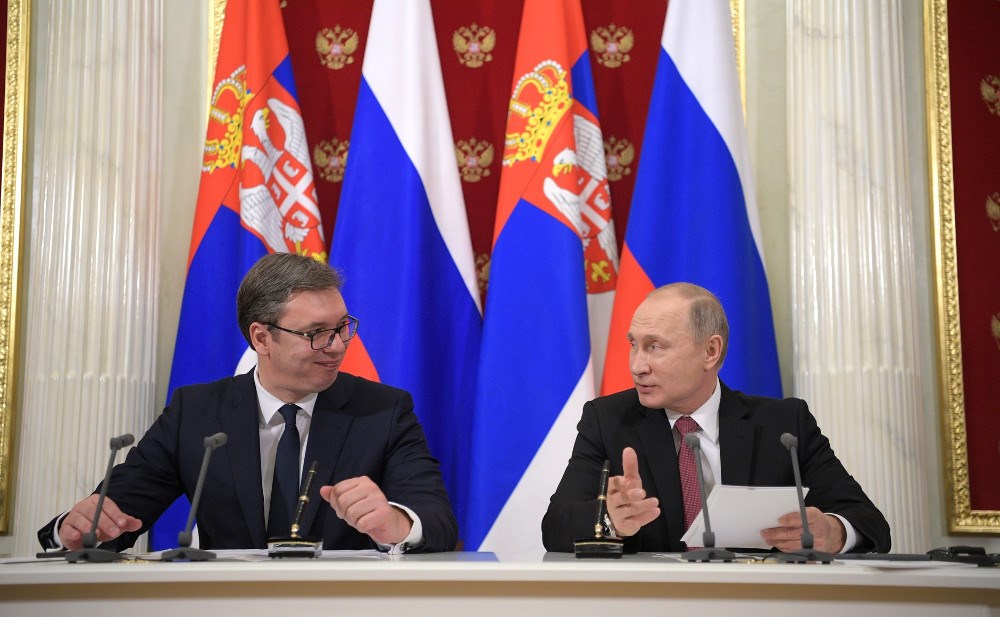As EU isolates Russia, Serbia embraces old ally
Belgrade chooses to strengthen its alliance with Russia amid the EU sanctions campaign against Moscow.
-

The Russian President and his Serbian counterpart
While the European Union tries to further isolate Russia and minimalize energy imports from the country, EU candidate Serbia is improving ties with Moscow through a new gas supply deal.
Belgrade condemned Russia's military advancement in Ukraine at the United Nations but refused to impose sanctions against what it considers "an old ally," even if the country aims to join the EU.
A three-year natural gas contract was signed between Belgrade and Moscow a day before the Europeans voted to ban most Russian oil imports this week, prompting a reprimand from Brussels.
Serbian President Aleksandar Vucic revealed the "very favorable" gas deal -- with "by far the best terms in Europe" -- following a phone call with Russia's Vladimir Putin on Sunday.
"We will have a safe winter when it comes to gas supply," the populist leader boasted, adding that in winter, Serbia will pay "one-tenth" of the price shelled out by other European countries.
In the meantime, Russia has cut gas supplies to several EU nations, which forces the bloc to reduce gas imports by two-thirds this year. Serbian media stated that the Russian Foreign Minister Sergey Lavrov is set to visit the Balkan country's capital soon, underscoring Belgrade's close relations with Moscow.
EU Spokesperson Peter Stano said the bloc expects Serbia "not to further strengthen its ties with Russia". "Candidate countries, including Serbia, are expected to progressively align their policies towards third countries with the policies and positions adopted by the European Union, including with restrictive measures," Stano said in a statement.
'Side deals'
Belgrade publicly declares that EU admission is a priority, but it has constantly avoided European policies that contradict Russian interests, while pro-government media echo the Kremlin's harsh words.
Serbian officials have accused Western countries of pressuring the capital to impose sanctions against Russia or to drop its EU bid over the issue.
"It's like they spent the last decade preparing Serbian society, not for EU accession, but for an alliance with Moscow," Srdjan Cvijic, member of The Balkans in Europe Policy Advisory Group (BiEPAG) think tank, told AFP.
Serbians choose Russia over EU
A recent opinion poll recorded that 40% of Serbians said they would be "happy" if their country gave up trying to join the EU and allied with Russia instead.
Moreover, Belgrade rejected the notion that cheap gas was the Kremlin's "reward" for not joining the sanctions campaign against Russia.
"All those who accuse us of not imposing sanctions against Russia because of a gas deal should be ashamed of themselves", Serbian Prime Minister Ana Brnabic told local media. "We don't impose sanctions against Russia out of principle."
Lavrov told Serbian media that Moscow was "certain that they (Serbians) will continue taking the smart choice in this situation."
"Energy monopoly"
Serbia's President has emphasized the diplomatic significance of Russia's unwillingness to accept international recognition of Serbia's breakaway province of Kosovo, as well as Belgrade and Moscow's historic, political, and cultural relations. But in reality, Belgrade has few moves to take.
The previous gas deal with Russia -- which was also well under market price -- was about to expire with no viable alternative in near future.
Serbia steadily granted Moscow a virtual monopoly over its energy sector over the last few decades by developing pipelines solely for Russian gas and selling the majority interest in its oil and gas firm (NIS) to the Russian energy behemoth Gazprom.

 4 Min Read
4 Min Read








